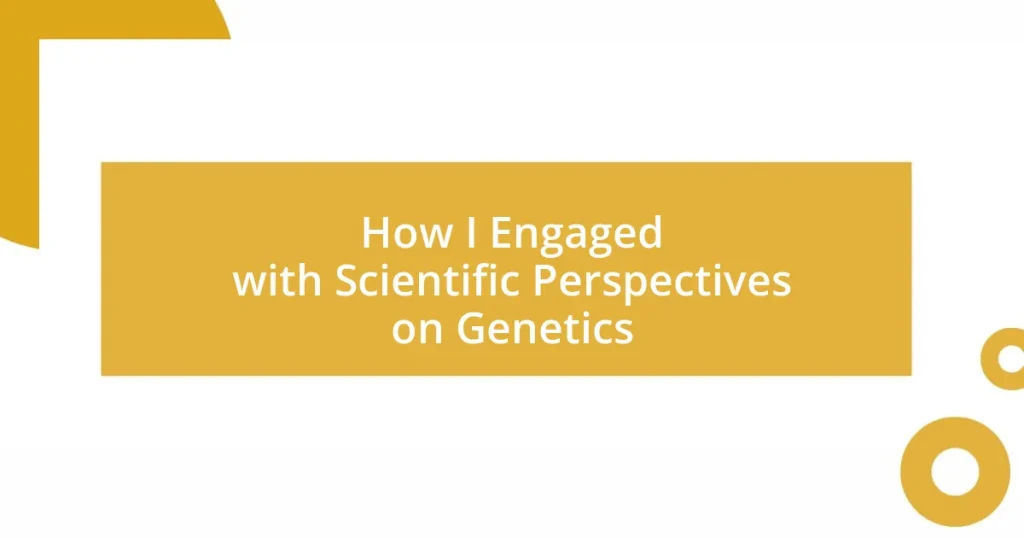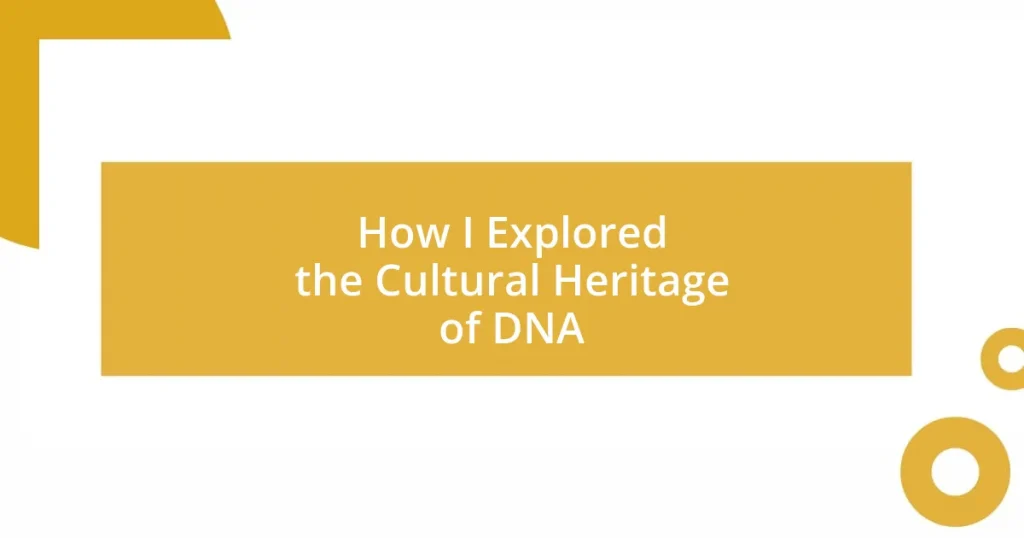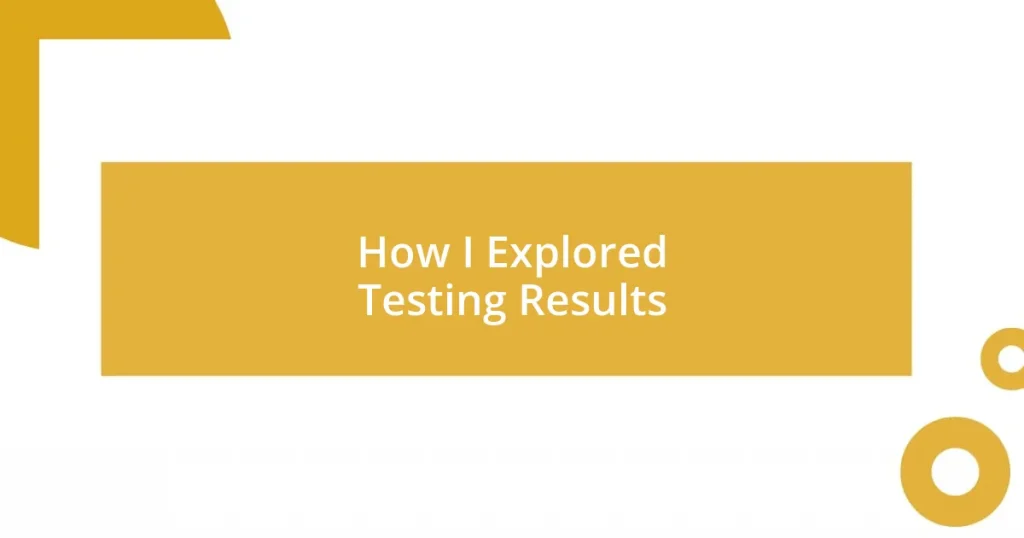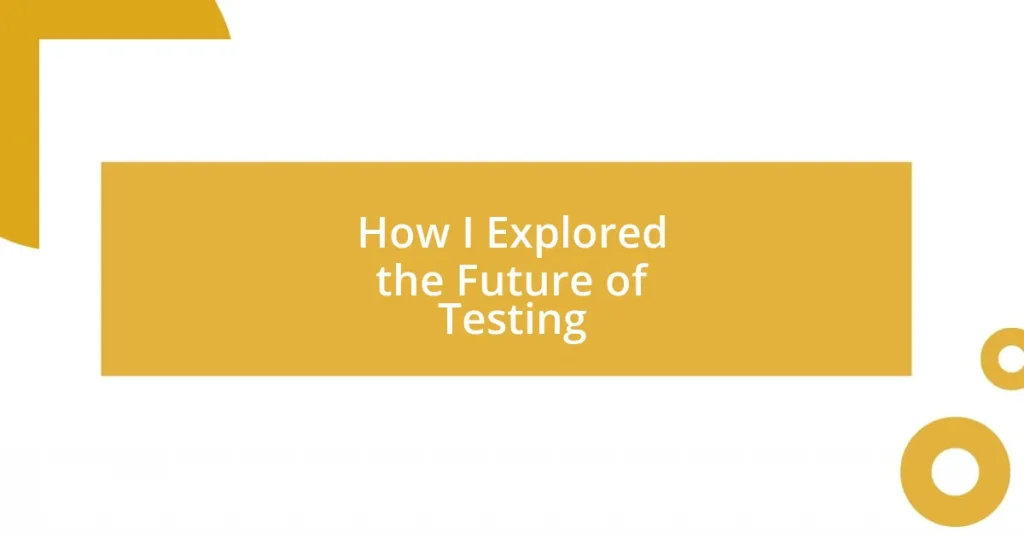Key takeaways:
- Genetics influences daily choices, health predispositions, and lifestyle adaptations, shaping personal decisions.
- Understanding epigenetics highlights the interplay between genetics and environmental factors, emphasizing the impact of lifestyle on genetic expression.
- Engagement with genetic research through workshops, journals, and discussions fosters a deeper understanding and connection to real-world implications.
- Ethical considerations in genetics, such as informed consent and the risk of discrimination, are crucial in navigating advancements like gene editing and personalized medicine.
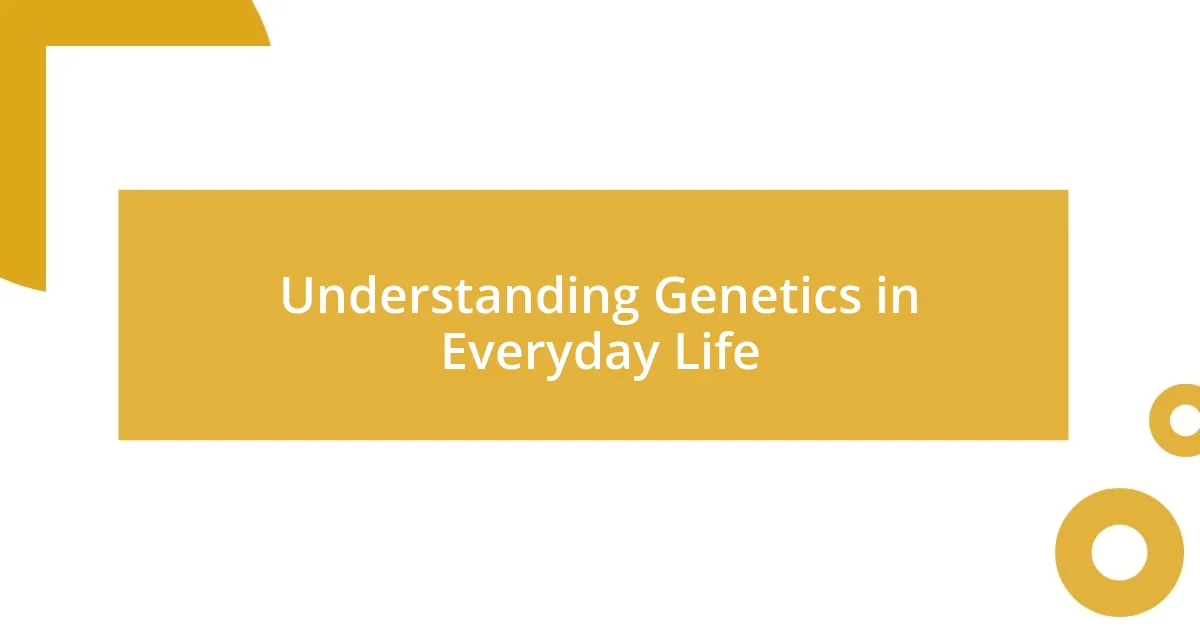
Understanding Genetics in Everyday Life
Genetics plays a surprisingly significant role in our daily choices, often in ways we don’t even realize. For instance, when I decided to take up gardening, I found myself fascinated by how certain plants thrived better in my backyard based on the soil and climate—both of which are influenced by genetic factors. Have you ever wondered why some friends have an easier time picking up new languages or sports? That’s their genetic makeup shining through, giving them a unique advantage.
In my family, traits are a hot topic of discussion around the dinner table, especially when it comes to health. My grandmother always warned us about certain conditions lurking in our genes, conveying a mix of concern and love. It made me think—how much of our future is shaped by this inherited information, and how proactive should we be in understanding it? The anxieties tied to knowing our genetic predispositions can be heavy, yet there’s a certain empowerment that comes with that knowledge, too.
What truly strikes me is the intersection of genetics with our lifestyle choices. When I changed my diet after discovering my sensitivity to gluten, I realized how interconnected our genetic traits and our health can be. It begs the question: how well do we really know our own bodies? Understanding genetics isn’t just a scientific endeavor; it’s a personal journey that profoundly shapes our lives and decisions.
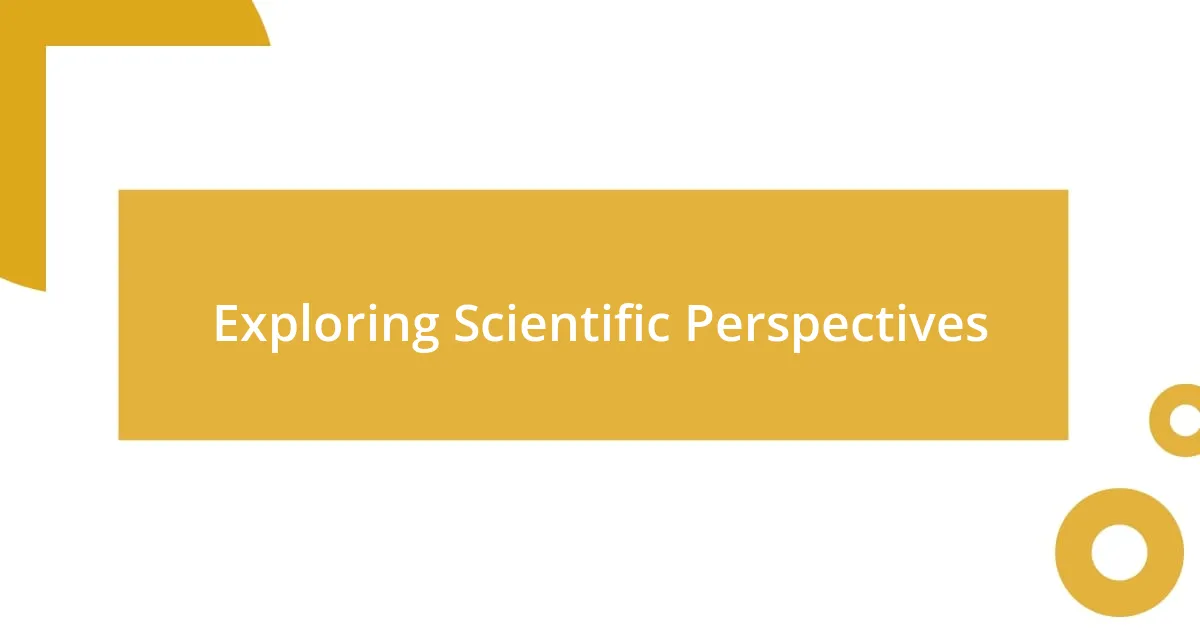
Exploring Scientific Perspectives
Diving into scientific perspectives on genetics has profoundly altered my understanding of life itself. I remember a particular moment in a lecture where the speaker highlighted the concept of epigenetics—how our environment can influence gene expression. It struck a chord with me because, as someone who has always enjoyed cooking, I began to see how the meals I prepared could potentially impact my family’s health. It’s fascinating to think that something as simple as what’s on our dinner plates can interact with our genes, shaping who we are in ways we might never fully appreciate.
- Genetics isn’t just about inherited traits; it involves a dynamic interplay with our environment.
- Epigenetics highlights the adaptability of genetics to lifestyle changes, making personal choices more impactful.
- I often reflect on how my recreational activities, like hiking, not only engage my body but also contribute to a positive genetic expression of health and well-being.
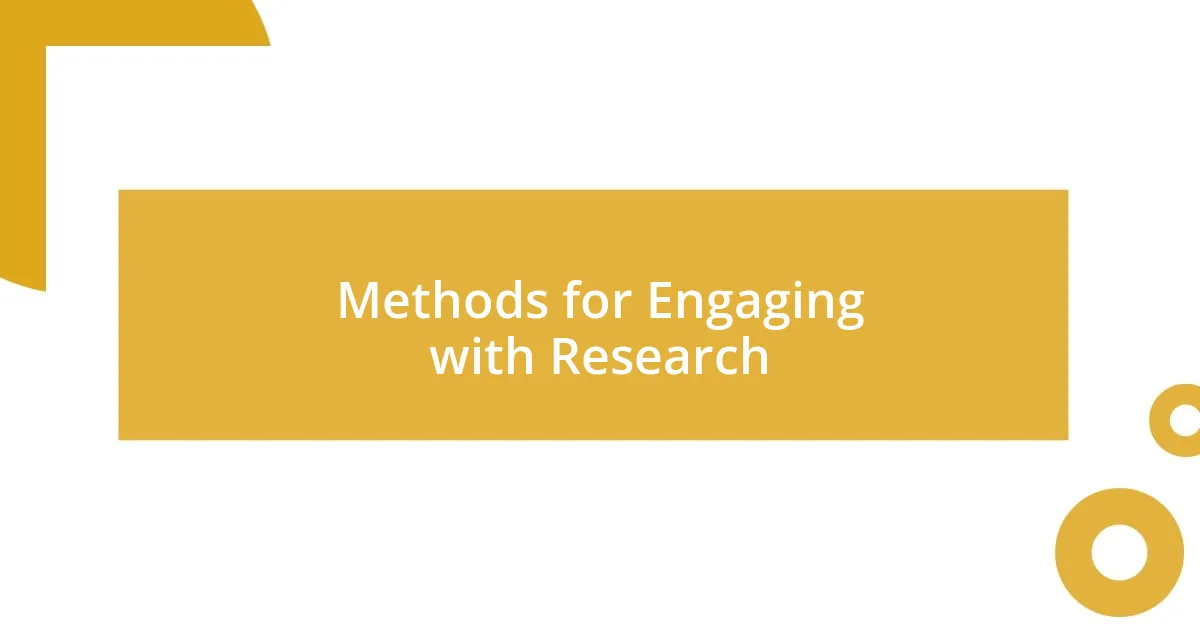
Methods for Engaging with Research
Engaging with research on genetics requires a multifaceted approach, something I’ve found enlightening through various methods. One effective way I connect with research is by attending workshops and seminars that focus specifically on genetics. These events not only deepen my understanding but also allow me to meet experts in the field, making the knowledge feel more alive. Have you ever had a conversation that changed your perspective on a topic? That’s exactly how I felt during one such seminar when I discovered how easy it can be to misinterpret genetic data.
Another method I’ve embraced is reading scientific journals and articles. I often dedicate time weekly to sift through the latest findings. It’s like peeking into the future—seeing firsthand how researchers are tackling genetic issues that may affect us all. Once, while reading about the role of genetics in mental health, I had a lightbulb moment that tied into my own family’s history and mental wellness. It made the research feel more relevant and urgent, reminding me of the collective responsibility we carry toward one another in understanding our genetic backgrounds.
Recently, I’ve also taken to online forums and discussion groups focused on genetics. Interacting with like-minded individuals gives me the chance to ask questions that pique my interest, and to hear diverse perspectives that challenge my assumptions. I vividly recall a discussion about CRISPR technology, where I learned how ethical considerations are as crucial as the science itself. Engaging with research is more than just passive reading; it’s a vibrant exchange of ideas and experiences that fosters deeper learning.
| Method | Description |
|---|---|
| Workshops/Seminars | Attend these events to engage with experts and gain insights directly from researchers. |
| Scientific Journals | Read current publications to stay updated on new findings and understand their implications. |
| Online Forums | Join discussions with peers to ask questions and explore different viewpoints on genetics. |
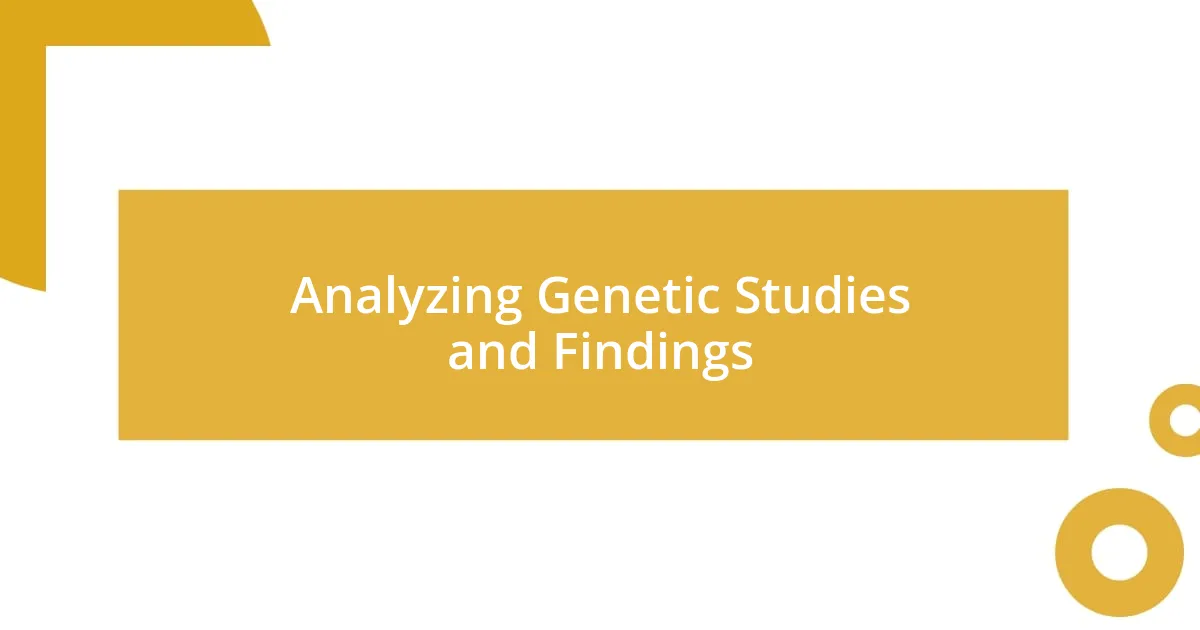
Analyzing Genetic Studies and Findings
Analyzing genetic studies requires a careful approach, and I often find myself grappling with the data presented. During one of my late-night study sessions, I stumbled upon a groundbreaking study on the genetic predisposition to various diseases. As I navigated through the graphs and statistical analyzes, I realized how crucial it is to understand the context behind the numbers. Have you ever felt overwhelmed by scientific data? I certainly did, but it pushed me to dig deeper and question how these findings apply to real-world scenarios.
As I delved into the findings, the power of genetic research became ever more apparent to me. I recall reading about a study that highlighted the correlation between certain genetic markers and responses to specific medications. It struck me how personal this was—many of my friends and family have varying reactions to treatments, and this could be explained by their genetic makeup. The human side of genetics fascinates me, making it essential for anyone engaging with this field to look beyond the laboratory and consider the tangible impacts on people’s lives.
Moreover, I think it’s important to be mindful of the limitations of these studies. Often, the nuances get overshadowed by headlines proclaiming a ‘gene for this’ or ‘gene for that.’ While reading a research article regarding hereditary traits, I distinctly remember the author cautioning readers against oversimplification. It made me reflect on how vital it is to approach scientific publications with a critical mindset. Are we ready to unpack the complexities of human genetics rather than getting lost in sensationalized narratives? I believe it’s our responsibility as engaged learners to seek out a richer understanding.
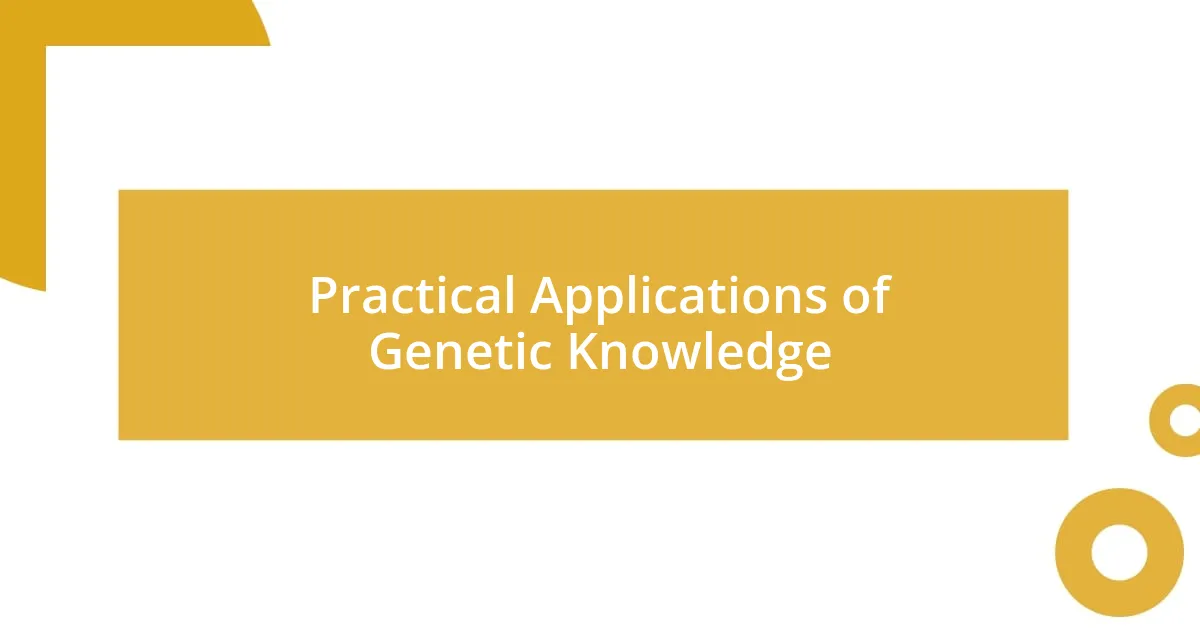
Practical Applications of Genetic Knowledge
Exploring the practical applications of genetic knowledge has been nothing short of fascinating for me. I vividly remember when I first encountered genetic testing through a friend who had it done to understand her risk for hereditary breast cancer. The emotional weight she felt when discussing her results made me realize how genetic insights can empower individuals to make informed health decisions. Have you ever wondered what knowing your genetic predispositions could mean for your own health choices?
In addition to personal health, genetics plays a crucial role in agriculture, specifically in breeding programs that enhance crop resistance to diseases. I was once involved in a community garden project where we experimented with different plant strains. Observing how genetic variations could lead to more resilient crops was eye-opening. It made me ponder about our food security and how genetic advancements could promote sustainable farming practices. Isn’t it incredible to think how genetics can impact what we eat and how we grow it?
On a broader scale, I find the ethical implications of genetic knowledge equally compelling. While attending a panel discussion about gene editing technologies, I felt a wave of concern wash over me as experts debated the potential for designer babies. This conversation left me questioning the implications of such advancements—who decides what traits are desirable? Engaging in these discussions has opened my eyes to the fact that while genetics offers amazing possibilities, it also carries profound responsibilities. How do we navigate these uncharted waters without losing sight of our humanity?
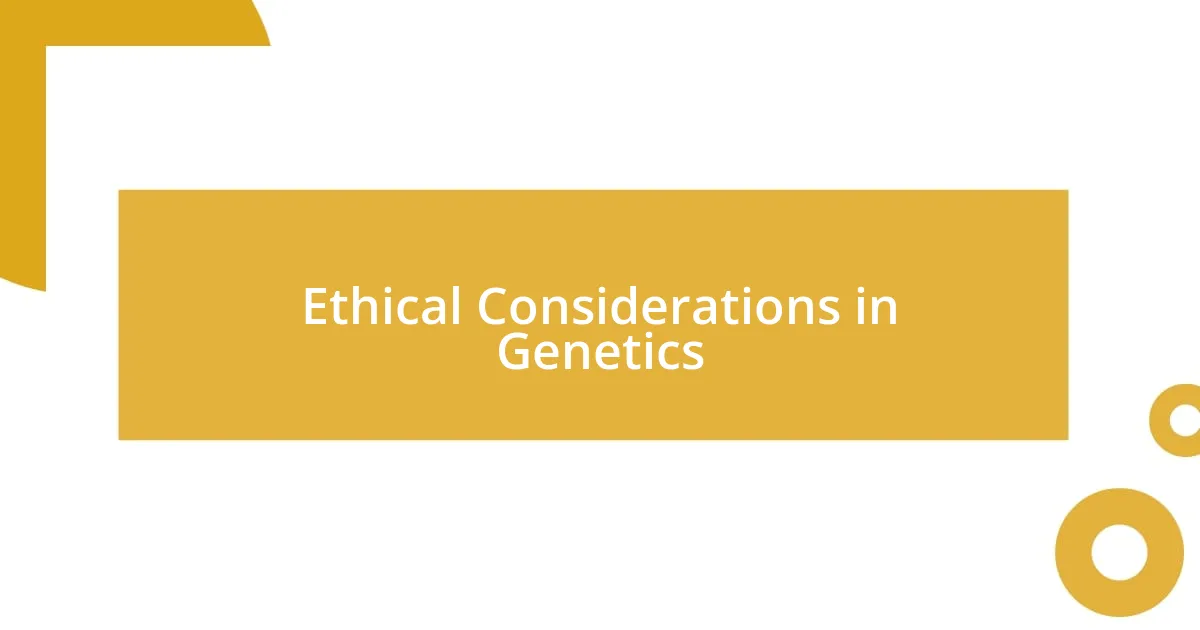
Ethical Considerations in Genetics
Engaging with the ethical considerations in genetics often leaves me deep in thought. I remember a time when a close friend confided in me about her anxiety regarding genetic testing. The fear of knowing what diseases she might inherit weighed heavily on her. It made me realize how ethically complex the decision to undergo such testing can be. Are we truly prepared for the weight that these revelations can carry? This experience underscored the importance of informed consent and the potential psychological burden that might accompany genetic knowledge.
When discussing gene editing technologies, I can’t help but feel both excitement and concern. I recently attended a symposium where researchers spoke about CRISPR and its potential to eradicate genetic disorders. However, I sensed an underlying tension in the room. Questions lingered—what if we crossed an ethical line? The notion of “playing God” echoes in my mind, prompting a crucial ethical dilemma: should we intervene in the very fabric of life? This dichotomy between innovation and moral responsibility is something I think we should all reflect upon.
From personal experience, I’ve seen how genetic data could lead to discrimination. A colleague once shared his fears of job loss if employers accessed genetic information that indicated a predisposition to certain illnesses. Hearing his perspective brought to light the need for strict regulations in how genetic data is used. Shouldn’t we safeguard our privacy and ensure that advancements in genetics do not inadvertently lead to inequality? These ethical questions guide my ongoing exploration of genetics, reminding me of the deep responsibility we have as we navigate this rapidly evolving field.
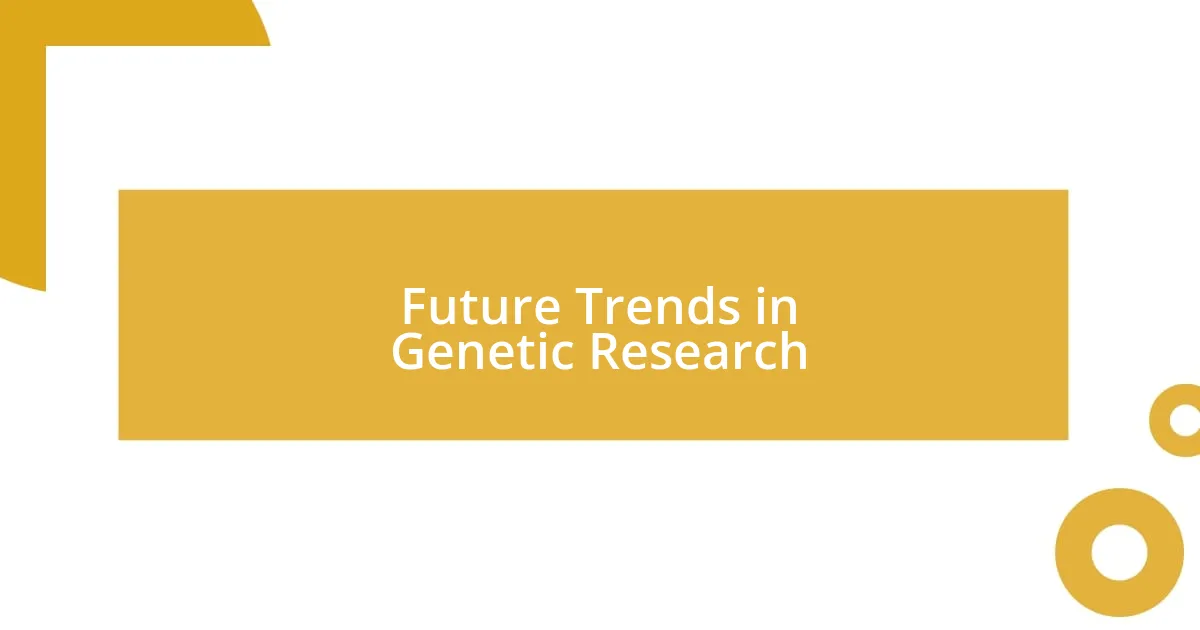
Future Trends in Genetic Research
One exciting trend in genetic research is the significant progress toward personalized medicine. Recently, while reading a study on how genetic profiling can tailor cancer treatment, I felt a spark of hope. The idea that doctors could select therapies based on a patient’s unique genetic makeup is revolutionary. Have you ever thought about how that could change the experience of fighting illness? It’s remarkable to envision a future where treatment isn’t just about standard protocols but is customized for each individual’s genetic profile.
Another area that’s grabbing my attention is gene therapy for genetic disorders. I recall a moving documentary about children with rare genetic conditions benefiting from new therapies that target specific genes. Seeing their families experience hope brought tears to my eyes. It made me question—how far can we push this technology? With advancements in CRISPR and similar technologies, we’re approaching a time when repairing faulty genes may become routine. The thought of potentially curing conditions that were once deemed untreatable feels like a dream come true.
Moreover, integrating artificial intelligence (AI) into genomic research is an area I find particularly intriguing. I remember discussing with a colleague how AI can predict genetic diseases by analyzing vast datasets, and it felt like we were peeking into the future. This reliance on technology raises critical questions—are we ready to trust machines with such sensitive information? As we embrace these innovative approaches, we must balance the excitement of scientific advancement with careful consideration of privacy and ethical challenges. How do we ensure that progress in genetics aligns with our values and priorities?










